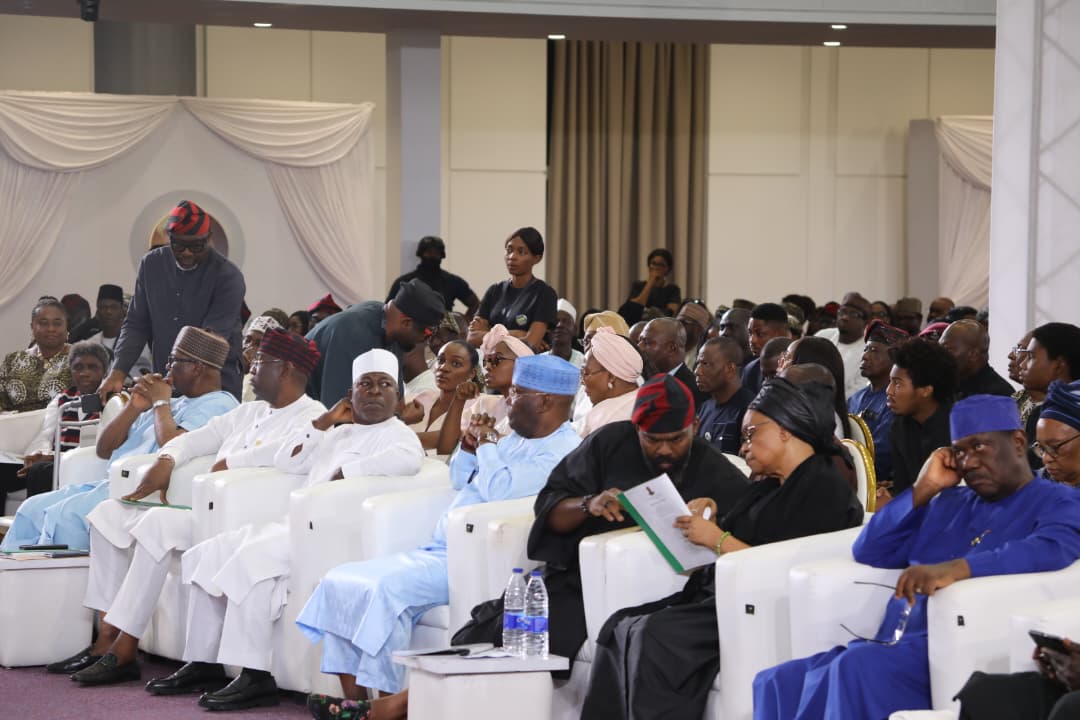By Adagbo Onoja
The Nigerian power elite pulled another stunning stunt Monday September 22nd, 2025 by overcoming all factional, fractional, class, ethno-religious, regional, gender, generational or ideological boundaries in converging at an ‘Evening of Tributes’ to Chief Audu Ogbeh. From 5 – 10 pm that day, one prominent member or another of the elite testified to Audu Ogbeh’s impeccable capacity for understanding and framing the issues, situations and events which governments in which he served were confronting. Apart from closing ranks, albeit temporarily and sparing five hours at a stretch for one of their own, none of them dissented from the elite consensus that Ogbeh was simply one of the best and most brilliant of them.
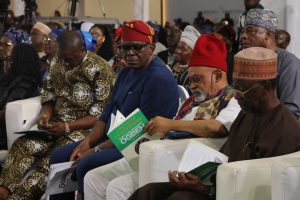 Although it will be hard to deny Dr Chris Ngige and Nasir el-Rufai the top ranks for the most explosive testimonies on Ogbeh, there is still a sense in which the totality of the testimonies confirmed the conceptual contention on death advanced by Chief Stephen Lawani, the Chairman of the Ogbeh Burial Planning Committee which superintended the ‘Evening of Tributes’. In a case for a national farewell for Chief Audu Ogbeh, Chief Lawani argued that death is so served by a skillful set of facility officers as to be inescapable, no matter how much human beings plan against it. Otherwise, there was no way death could breakthrough a human shield formed around Audu Ogbeh by the caliber of people gathered to pay their tributes to him.
Although it will be hard to deny Dr Chris Ngige and Nasir el-Rufai the top ranks for the most explosive testimonies on Ogbeh, there is still a sense in which the totality of the testimonies confirmed the conceptual contention on death advanced by Chief Stephen Lawani, the Chairman of the Ogbeh Burial Planning Committee which superintended the ‘Evening of Tributes’. In a case for a national farewell for Chief Audu Ogbeh, Chief Lawani argued that death is so served by a skillful set of facility officers as to be inescapable, no matter how much human beings plan against it. Otherwise, there was no way death could breakthrough a human shield formed around Audu Ogbeh by the caliber of people gathered to pay their tributes to him.
Senator George Akume, the Chief Scribe of the government of the day was there, representing president Tinubu just as there were former Vice-president Atiku Abubakar, presidential contender Peter Obi; Akume’s predecessor, Boss Mustapha and Boss Mustapha’s predecessor, Engineer Babachir Lawal; one time Foreign Affairs Minister Chief Tom Ikimi; Prof Jerry Gana, General Chris Garba, Sanusi Daggash (not sure if this is the retired military officer or the former member of House of Representatives); Dr Ben Obi; incumbent Minister of Livestock Development, Idi Mukhtar; Mrs Kemi Adeosun, Buhari’s first Minister of Finance; Immediate past governor of Kaduna State, Nasir el-Rufai; Ex- governor Obong Victor Attah of Akwa Ibom State; Dr Gabriel Suswam, Ex-Kwara governor, Abdulfathai Ahmed; Ex-governor Donald Duke of Cross Rivers State; Mallam Adamu Maina Waziri who was a minister under Obasanjo; Dame Pauline Tallen, Barrister Geoffrey Onyema who was Buhari’s Minister of Foreign Affairs; Chief Titi Abubakar, wife of Alhaji Atiku Abubakar; Alhaji Senator Dino Melaye, Senator Grace Bent; Mallam Kashim Imam; Ex-TV journalist Omotayo Omotosho, Dr. Mrs Mary Ogbeh, a Federal Permanent Secretary; Dr Yemi Ogunbiyi; the leaders of the Kings College Old Boys Association; Aliade Old Boys Association (AOBA); Arewa Consultative Forum (ACF); Northern Elders Forum (NEF).
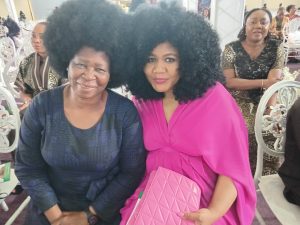
Activist Ene Obi and KK Ikwue who performed ahead of her father at the event
There was, of course, Bongos Ikwue, who made everyone in the hall a performer of his ‘Cockcrow at Dawn’ and ‘Ameen’. It was difficult to see anyone even on the ‘High table’ who was not clapping or shaking his or her head as he sang his famous track, ‘Amen’. He had started with ‘Cockcrow at Dawn’. The crowd followed him. It was a successful outing for Bongos who came to stage a farewell performance for his junior, Audu Ogbeh. Before the performance, he told the story of how he hosted the late Chinua Achebe and the late Paul Unongo in his Makurdi residence. It was a night long meeting. Audu Ogbeh was not at the meeting but he was the subject matter. Bongos said Audu Ogbeh could have been a writer, a journalist and more. K K Ikwue, Bongos talented daughter, preceded him with a solo performance. What a musical family!
Not only is this list just a tip of the iceberg, it was a full house from the beginning to the end. In anticipation of how impracticable it would have been to break through a shield formed by an assemblage of this nature, death came to Audu Ogbeh through difficulty in breathing and strutted away proudly in a matter of hours early morning of August 9th, 2025. So, Lawani is right in his conceptual framework on death.
What death is, however, never able to block is the unfolding of collective memory about those it takes away. Senator George Akume who read President Tinubu’s tribute added how Audu Ogbeh had his Rosary in his pocket the night assailants went to kill him. Akume called the assailants ‘forces of evil’ whom Ogbeh survived. His boss, Tinubu, called Ogbeh a bridge builder who put the interest of Nigeria above any other contention. He recalled his additional sacrifice of serving as Honourary Adviser on Agriculture to ex-President Obasanjo, insisting on everyone drawing lessons from Ogbeh while reflecting on his death.
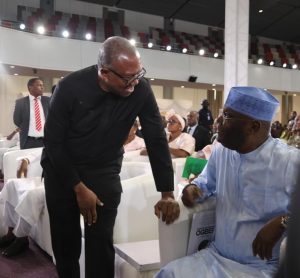
Peter Obi with Atiku Abubakar at the event
Reflecting on their relationship in government, Atiku Abubakar feels a personal loss in Ogbeh’s death. Priding himself on working with extremely brilliant people, Atiku said Ogbeh was a remarkable gentleman who lived for the common man, honesty and integrity. He had come with his wife, Titi Abubakar, to pay tribute to someone he said made great contribution to the making of the party (PDP in this case).
Dr. Chris Ngige, former governor of Anambra who is believed to be at the centre of the Audu Ogbeh – Obasanjo split in 2005 brought an explosive edge to the evening. But it was an intelligent one-man march past. His first salvo went to members of the Kings College Old Boys Association. Chief Ogbeh did his HSC in the school. And the Old Boys had been the first to be called to kickstart the tributes. They came in large numbers to describe Ogbeh as one of their finest, one who could handle high profile national assignments only as a result of his awareness of the heritage of being a ‘Kingsmen’, the cognomen by which products of the college established in 1901 have signify themselves. They quoted powerful Ogbeh-seque rhetoric from an address he gave them in 2014. It went well until Ngige took the floor only to accuse them of taking what does not belong to the. He meant that only Mount Saint Michaels, Aliade could appropriate Ogbeh that way because HSC was but just a 2-year affair. With that, he served notice that he wasn’t on a tiptoeing mission but sundering sacred cows.
His memory is that Ogbeh and Mark Okoye were the youngest of Shagari’s ministers in the 2nd Republic. And that Ogbeh got them wondering what sort of minister he was who would prefer the accommodation they had to the ministerial Suite booked by the Ministry of Communication where he was the boss. Ogbeh was in the East to be the Best man at Mark Okoye’s wedding in 1982.
Ngige’s next meeting point with Ogbeh was when Ogbeh became the Director of Campaigns of Dr Alex Ekwueme’s exertions. According to Ngige, there was nothing to debate, edit or amend in the organogram Ogbeh presented. Hence their exclamation, ‘who did this to us’ when some people went to assassinate Ogbeh. The assailants didn’t kill him but recovery from the injury took a long time for him to recover from.
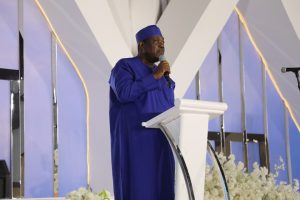
Senator Akume on the podium
Without mentioning former president Obasanjo, Ngige said someone misread Ogbeh’s personality typology in dumping Barnabas Gemade as PDP National Chairman in 2001. Ogbeh turned out too far from a malleable fellow, telling the president that he didn’t own the party and then going to Abeokuta to give a lecture that was a critique of Obasanjo’s own framework for managing the economy. “They underrated Ogbeh”, he said, concluding by calling him a precious gem, the grandmaster in eloquence, brilliance and knowledgeability.
Ngige did not fire salvos only on the living, he also has assignment for the dead. As Ogbeh gets to meet those who went before him, Ngige would want him to deliver a message to welcoming team sure to be made up of the Ziks, Sardauna, Awo and so on. The message: tell them that things are still bad in Nigeria. he got an applause.
Nasir el-Rufai, immediate past governor of Kaduna State, took the floor close to the end of the tributes because he came in much, much later, long after Ngige but it makes sense to make the two contiguous. Ogbeh’s death made him so sad he has not been able to write a tribute, he said. three reasons account for his sadness. The first is how Ogbeh convinced Obasanjo and his VP in 2003 that ministerial nominees must be interviewed, providing an initial scrutiny process to establish what vision they may have. So, Obasanjo, Atiku and Ogbeh formed the interview team before whom every nominee must appear. When el-Rufai entered to be interviewed, Ogbeh asked him to tell them his most favourite city in the world. el-Rufai answered it was previously Paris but Singapore had displaced Paris in his mind because it is a functional city. Ogbeh came again: how long will it take you to convert Abuja into Singapore? He gave them an answer and his interview was over.
At the end of the day, el-Rufai was posted to the FCT as Minister. His posting was no longer a surprise because Ogbeh’s questions had hinted him of that. el-Rufai’s testimony closes a small gap in his unfolding on Abuja in Obasanjo’s 2nd term. Obasanjo has said several times that, for his 2nd term, he was looking for a mad man who could clean up Abuja. When he asked Atiku if he knew such a mad man, Abuja said he knew one and he is called el-Rufai. The value Ogbeh added was to provide the framework for the cleaning process by asking el-Rufai if he had a model. So, with the party leader, the president and the VP, el-Rufai no longer thought of the need for the ‘inside story’ behind any violation of the so-called Master Plan and be as nuanced as Obasanjo and Ogbeh were.
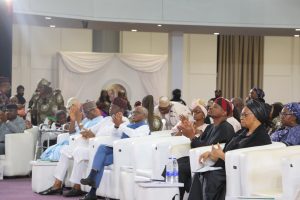
Mallam Nasir el-Rufai with others
Interestingly, el-Rufai’s second instance of Ogbeh’s influence on him showed how Ogbeh would not have brought so much suffering if he were Abuja Minister. A building belonging to the Catholic Church in Asokoro had turned out a perfect fit for demolition. It was particularly a threat to free flow of traffic. But before el-Rufai’s demolition squad could get onto the job, senior Catholic leaders went to him to make a case for an exception. They met a brick wall. Somehow, they went to Ogbeh and, according to el-Rufai, when they turned up in his office again, it was with Ogbeh. Ogbeh was for demolition of any structure that was an aberration. However, he had a problem with the reason for this particular demolition: could the inconvenience through blockage of traffic once a week be a good reason to sacrifice the prayers the church offers for Nigeria and Nigerians?
In el-Rufai’s words, only Ogbeh’s ‘law of balance’ reasoning saved the church. That approach to reasoning meant that though a strong Catholic, religion never colored Ogbeh’s reasoning. Otherwise, the building would have been a football field or so by now, he said. Ogbeh, he added, was a wonderful person.
There was a third illustration of the Ogbeh factor in el-Rufaism. Shortly after the 2015 presidential election, someone who considered himself a good fit material for the position of Secretary to the Government of the Federation went to el-Rufai to ask him to put in words for him with late President Buhari. el-Rufai went to Buhari to tell him there was someone who wanted that office. Buhari told him that position was going to a Christian from the cultural Middle Belt because he (Buhari) needed to give a lie to the propaganda which had painted him as someone who hated Christians/Christianity. el-Rufai delivered Buhari’s message to the office seeker but also asked Buhari whom he had in mind for the job. Buhari, according to el-Rufai, said he had penciled down Audu Ogbeh for the job and for which el-Rufai told the in-coming president: “congratulations. That is your best bet”
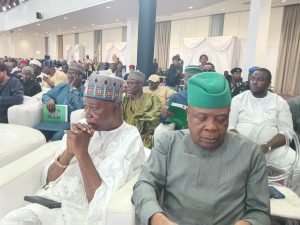
Former gov of Imo State, Emeka Ihedioha (in green beret) with others
But that was before matters went the other way. Again, by el-Rufai’s testimony, some people concocted the story and sold it to Buhari to the effect that Audu Ogbeh is/was indebted to the banks to the tune of between one to two billion Naira and if he became the SGF, he would use the office to make money to repay the loan. The brains behind the script managed to convince Buhari against making Audu Ogbeh the SGF, warning Buhari about how Audu Ogbeh was too independent minded to be his SGF. The rest is now history. Ogbeh never became SGF. He became the Minister for Agriculture, moving Nigeria from spending billions importing rice to national self-reliance there.
The nods of approval in the hall at this point was such that were the hall a presidential election polling station, el-Rufai or his preferred candidate would be the outright winner. He built his narrative on an empirical weight that removed the discursive condition of emergence in the eyes of most of his listeners. He had started by telling the story of one of the things Ogbeh enabled. On landing at the FCT Ministry, he discovered, for one, that indigenes of just three states owned 60 per cent of residential plots in Abuja, a contravention of the principle of equity. The problem was tabled. Ogbeh suggested they identify states which did not have lands in the FCT. It was so that the imbalance could be redressed, most likely by giving such states allocations through their housing agency.
Obasanjo approved of the plan but restricted it to states that voted for the PDP. To use el-Rufai’s language, Ogbeh dismissed that as nonsense. So, with Ogbeh’s support, el-Rufai gave every disfavoured states its own share of land in Abuja.
Boss Mustapha, the immediate past SGF, called Ogbeh an archive in himself, a powerful player in the making of the APC, crediting him further with doing everything possible to improve things under the Buhari regime. Mustapha equally told a story that showed a different side of Ogbeh in terms of managing complexity.
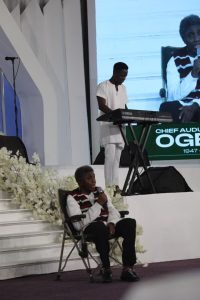
Bongos Ikwue performing from a sitting position
Mr. Sam Nda Isaiah, the late publisher of Leadership, was determined to contest against Buhari in 2015. He resisted all pressure on him against making that move. When he set a date for the flagging off of his campaign, Ogbeh told the team they should be physically there at the event. Officially, it was a sort of solidarity for a Middle Belter.
Relying on the authority of the Holy Bible, Mustapha kicked against turning Ogbeh’s demise into a case of mourning. Although the Middle Belt and Nigeria would miss what Mustapha called Ogbeh’s brilliance, “we should not mourn”, he admonished.
Dame Pauline Tallen followed that line, calling Ogbeh a true Nigerian and a Middle Belt loss. She too told the story of her interaction with Ogbeh of late. She recalls Ogbeh asking her to join him in his car for the return journey to Abuja from an event both attended in Jos. Unlike previously when she used being on the road to catch up on sleep, Ogbeh kept her in top class conversation and it was all about how an agro-industrial transformation strategy is Nigeria’s way out.
TV personality, Omotayo Omotosho centralised Ogbeh’s eloquence, depth of character, integrity and realness as for her to declare Ogbeh the meaning of the word gentleman.
Led by Prof Danjuma Sheni (hopes this is the correct spelling), the Northern Elders Forum noted Ogbeh as its loss, particularly in the light of a North-centric summit it has scheduled for later this year and for which an Ogbeh would have been a vital resource person. Prof Sheni said they had specific instructions from Ango Abdullahi, the leader of the forum to be at the ‘Evening of Tributes’ by all means.
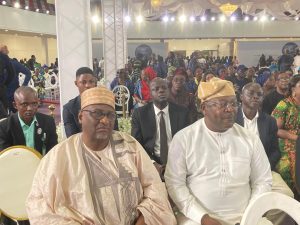
Mallam Adamu Muazu, former governor of Bauchi State and an ex-National Chairman of the PDP
Alhaji Idi Mukhtar, Minister of Livestock Development, credited Ogbeh with seeing what he (minister) wasn’t seeing. He was referring to Ogbeh’s insights and wisdom on which bases he categorised him to be irreplaceable. Barrister Geoffrey Onyeama, Minister of Foreign Affairs who has spent the longest time in that office recognised Ogbeh’s voice for small and medium scale businesses, especially the case for reducing the interest rate. He said Ogbeh was consistent on that advocacy before veering to place on record Ogbeh never being about being in office but about service. He graded Ogbeh as a legend on points of clarity of thought, humility, availability and receptiveness.
Onyeama had a story. Acting on speculations, he went to introduce himself to Chief Ogbeh as the likely Minister of State for Agriculture. The reception was a humbling encounter for him. So much so that even when he emerged as the Foreign Affairs Minister, he made himself a student of Ogbeh.
Prof Jerry Gana came to the floor with a truckload of adjectives for Ogbeh. Starting with a green card for Chief Stephen Lawani for the impeccable organisation of the event, Gana rated Ogbeh a man who was tremendous in ideas, knowledge, integrity, consistency, leadership and on the issue of honour. The Idoma nation, he said, has every reason to be proud of Ogbeh, “a man who took nonsense from nobody, including the president”.
Speaking as the representative of the governor of Benue State, Dr Sam Ode assured that everything had been put in place for the Benue State end of the rites of passage. His speech marked the transition of the tributes to the Benue component of the audience. Dr Gabriel Suswam, a former governor of the state was there but he didn’t speak.
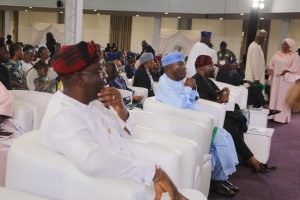
Dr Sam Ode, Dep Gov, Benue State (in red stripes cap) with others
In welcoming attendees to the event at the start, Chief Stephen Lawani, the Chairman of the Planning Committee advanced an argument worth quoting in full. It goes as follows: Chief Audu Ogbeh is the kind of person to whom tributes from all corners of Nigeria is of high value. Hailing from Benue State in the Middle Belt, he studied in Lagos in the Southwest of Nigeria and later in the Northwest, married from the Southsouth, coordinated the presidential campaign of a presidential aspirant from the Southeast, rose to be the Chairman of a leading national political party before becoming the Chairman of one of Nigeria’s most complicated fissure management NGO – the Arewa Consultative Forum (ACF) and lately, the Minister for Agriculture and Rural Development”. It went straight to a good prediction of what happened at the event.
Sunday Ogbeh who spoke for the family, called his departed brother a visionary in the field of Agriculture who, additionally, saw humanity first in both his public and private domains.
In the speech of the Abuja branch of the Aliade Old Boys Association (AOBA) read by Cde John Odah, Audu Ogbeh was described as a touch bearer of the Alma Matter, who together with other Michaelites such as and John Onaiyekan, Stephen Lawani, General Chris Garba have been shining light of the secondary school in serving Nigeria. As if in agreement with Boss Mustapha’s edict against mourning, Cde Odah said the family might have lost Ogbeh in the flesh, “his name will forever remain among those who gave their all in the service of our country, courtesy of his exemplary life and stainless service”.
A grandson of Chief Ogbeh blew the minds of his listeners. Lemmy Adegbe who is just about entering the university was so revealing. He spoke of long fascinating conversations with grandpa, each session of which sparked his curiosity. He spoke of the rush to his bedroom for a quick embrace which always ended in prolonged encounters between a grandson and a philosopher grandfather. Lemmy told the story of a visit to a Museum where he found his grandpa more knowledgeable on the dates of the events preserved than the Museum hands.
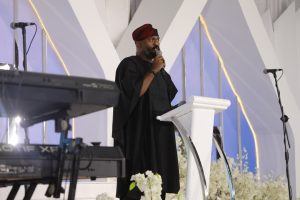
Adegbe Ogbeh
Chief mourner, Adegbe Ogbeh closed the session with gratitude to all who made the over 5-hour session possible, from the president and Commander – in – Chief to the Vice-president, the SGF, the Benue State Government, friends and associates of his departed dad, all those who attended the event and, above all, the Planning Committee.
The plausible conclusion from the ‘Evening of Tributes’ is that what Chief Lawani calls the Audu Ogbeh moment in his welcome address is a story too long and complex to be completed in a day. Different speakers have brought different insights from diverse angles. Hinted but directly avoided, for example, is the issue of the real problem between Ogbeh and Obasanjo. They were the best of friends long before Obasanjo became president. They were both in agriculture and shared many other features. How did it happen that they couldn’t travel far and how did it happen that the Nigerian establishment had no back channel to make them work together.
Ogbeh had started reflecting on that. How far he went is what is not clear to those not close enough to him. He has once wondered whether he was probably not being too much of an idealist. That is what he said immediately the break with Obasanjo occurred. The word ‘idealist in Ogbeh’s sense is the same thing as what Prof Jerry Gana who also suffered the Obasanjo-effect called “the man who took nonsense from nobody, including the president”. In using the word idealism, Ogbeh was not suggesting he went out of his mind for a minute.
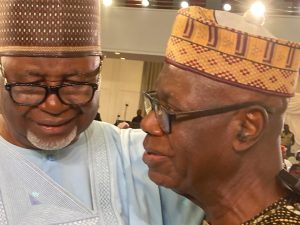
Chief Lawani on the left and Mr John Oloche Edache, another Aliade Old Boy who was a Permanent Secretary and FAO Regional Director
Perhaps, only Ogbeh’s biography will resolve the context (not cause) of the break in relationship should the biography come out as was originally planned.
Except if the Atiku Abubakars of this world were, like Ngige or Nasir el-Rufai, ready to speak on that. Atiku is clearly not in the mood for anything explosive at the moment. But the break between Ogbeh and Obasanjo was not just another break between two adults but one that has taken and still taking its toll on this sad land called Nigeria. It was disheartening hearing Jerry Gana say at the end of his tribute to Ogbeh that “Nigeria has no reason to be in this kind of situation”. He should know because he has seen it all. Ngige said the same thing and, by the authority of Chief Lawani, (see the link above) Ogbeh was always hoping that things would get better. And much of his sadness, said Lawani, were not about himself but about Nigeria and Nigerians. These views are not necessarily criticisms of the government of the day but serious concerns about a journey that seems to be leading anywhere for a country of over 200 million souls!

